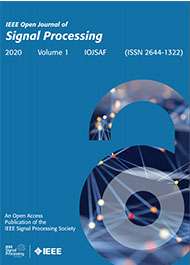Multi Stage Kalman Filter (MSKF) Based Time-Varying Sparse Channel Estimation With Fast Convergence
Top Reasons to Join SPS Today!
1. IEEE Signal Processing Magazine
2. Signal Processing Digital Library*
3. Inside Signal Processing Newsletter
4. SPS Resource Center
5. Career advancement & recognition
6. Discounts on conferences and publications
7. Professional networking
8. Communities for students, young professionals, and women
9. Volunteer opportunities
10. Coming soon! PDH/CEU credits
Click here to learn more.
Multi Stage Kalman Filter (MSKF) Based Time-Varying Sparse Channel Estimation With Fast Convergence
The paper develops novel algorithms for time-varying (TV) sparse channel estimation in Massive multiple-input, multiple-output (MMIMO) systems. This is achieved by employing a novel reduced (non-uniformly spaced tap) delay-line equalizer, which can be related to low/reduced rank filters. This low rank filter is implemented by deriving an innovative TV (Krylov-space based) Multi-Stage Kalman Filter (MSKF), employing appropriate state estimation techniques. MSKF converges very quickly, within few stages/iterations (at each symbol). This is possible because MSKF uses those signal spaces, maximally correlated with the desired signal, rather than the standard principal component (PCA) signal spaces. MSKF is also able to reduce channel tracking errors, encountered by a standard Kalman filter in a high-mobility channel. In addition, MSKF is well suited for large-scale MMIMO systems. This is unlike most existing methods, including recent Bayesian-Belief Propagation, Krylov, fast iterative re-weighted compressed sensing (RCS) and minimum rank minimization methods, which requires more and more iterations to converge, as the scale of MMIMO system increases. A Bayesian Cramer Rao lower bound (BCRLB) for noisy CS (in sparse channel) is also derived, which provides a benchamrk for the performance for novel MSKF and other CS estimators.
Massive MIMO (MMIMO) systems are considered for high data rate communications in sparse channels, e. g. digital television (DTV) [1], [2], echo cancellation, underwater [3], millimeter-wave (mmwave) 5 G communications [4]. For example, in terrestrial DTV transmission [1], [2], a typical receiver is expected to handle multipath with delays as long as
SPS Social Media
- IEEE SPS Facebook Page https://www.facebook.com/ieeeSPS
- IEEE SPS X Page https://x.com/IEEEsps
- IEEE SPS Instagram Page https://www.instagram.com/ieeesps/?hl=en
- IEEE SPS LinkedIn Page https://www.linkedin.com/company/ieeesps/
- IEEE SPS YouTube Channel https://www.youtube.com/ieeeSPS










